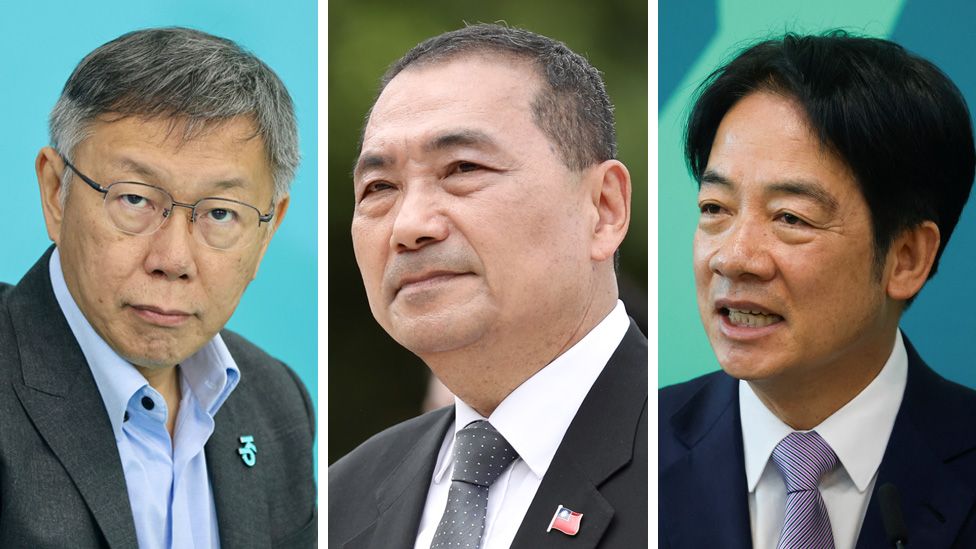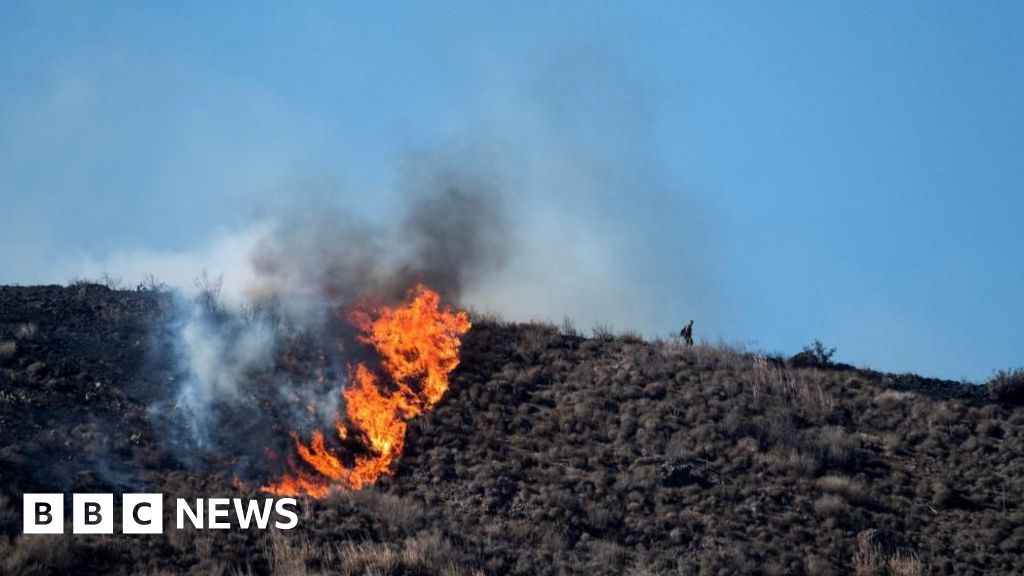ARTICLE AD BOX
 Image source, EPA
Image source, EPA
(L-R) Ko Wen-je, Hou Yu-ih and William Lai are in a three-way race to be leader
On 13 January, Taiwan will elect a new president in a critical race that could redefine the island's relationship with China.
Beijing has long claimed self-governed Taiwan as a breakaway province and has loomed over the island's elections since the first one in 1996.
This year's race to replace sitting President Tsai Ing-wen is happening at a time when Taiwan has emerged as a key flashpoint between the US and China. Geopolitics aside, low wages and soaring home prices are among the domestic challenges weighing on voters.
The current vice-president from the governing Democratic Progressive Party (DPP) is on the ballot. He is leading polls by a small margin, followed by a former police chief who is running on the main opposition party Koumintang or KMT's ticket. An ex-city mayor, who had initially upset calculations in the winner-takes-all race, appears now to be trailing well behind. The legislative elections, where each voter will cast one ballot for their district and another for at-large seats, will run on the same day.
Here's more on the three presidential hopefuls and their running mates.
The frontrunner: William Lai Ching-te, DPP
Image source, Getty Images
He may be soft spoken, but Taiwan's 64-year-old vice-president is a staunch defender of the island's self-governing status - with China's state-run Global Times even calling for him to be prosecuted under Beijing's anti-secession laws.
During his tenure as President Tsai's premier from 2017 to 2019, Mr Lai described himself as a "pragmatic worker for Taiwanese independence".
Mr Lai's father died in an accident when he was two. Watching his mother raise six children by herself fostered a strong work ethic in Mr Lai, he says. He was medically trained in Harvard and worked as a renal doctor before he entered public service in Taiwan in the mid-1990s.
He first served as a lawmaker representing the southern city of Tainan. He was elected the city's mayor in 2010 and held on to the post in 2014 with an unprecedented 73% of the vote.
He remains the current frontrunner by a tiny margin, with a recent poll by the Taiwanese Public Opinion Foundation (TPOF) putting him ahead of Mr Hou by just 1% with a 38% rating.
In his presidential campaign, Mr Lai has repeatedly said that Taiwan hopes to "be friends" with China. "We don't want to be enemies. We can be friends. And we [would] love to see China... enjoy democracy and freedom, just like us," he told Bloomberg in August.
Beijing, in turn, has called Mr Lai a "troublemaker through and through".
But his running mate, Hsiao Bi-khim, appears to infuriate Beijing even more. She was born in Japan and mostly grew up in the US, cementing her links to Taiwan's strongest allies, which are also China's toughest diplomatic relationships.
China has called Ms Hsiao a "diehard Taiwan independence separatist". Beijing has twice sanctioned the high-profile diplomat from entering mainland China and has also prohibited investors and firms related to her from working with organisations on the mainland.
Ms Hsiao brings a wealth of foreign policy experience to Mr Lai's ticket. The 52-year-old served as Taiwan's representative to the US for the last three years. She was the first woman to take on this role.
When it comes to statecraft, she calls herself a "cat warrior" - a retort to the combative "wolf warrior" style of diplomacy that Beijing encouraged until recently.
"Cats are much more lovable than wolves. In diplomacy, it's about making friends," she told The Economist last month. "It's about making yourselves lovable."
The reticent one: Hou Yu-ih, KMT
As a child, Mr Hou supported his family's business by catching pigs or helping out at their pork stall in a local market.
The 66-year-old once said the skills he developed while taking on pigs helped build his career as a policeman. He helped arrest high-profile murderers and was also a key investigator in the assassination attempt on ex-president Chen Shui-bian in 2004.
The former police chief turned to politics in 2010 and became mayor of New Taipei, Taiwan's most populous city, in 2018. He was re-elected in a landslide in 2022. Mr Hou's track record as a competent policeman and a popular mayor made him the KMT's top pick as it seeks to reclaim Taiwan's leadership after eight years. Mr Hou had initially struggled to gain traction, but has moved up in polls since KMT's attempt to mount a joint ticket with another opposition candidate failed.
Mr Hou opposes Taiwan independence but has largely avoided voicing his stance on China in this campaign. This lack of clarity has drawn criticism. He dodged a question on the "One-China" policy - which recognises only one Chinese government, in Beijing - at a university forum in June 2023, calling into question his ability to manage dicey diplomacy.
"The relationship between the two sides of the Taiwan Strait is clear. We don't need to get it confused… It is completely based on the constitution of the Republic of China," he said then.
The KMT's vice-presidential nominee Jaw Shaw-kong is a well-known political commentator and one-time leader of the right-wing New Party. The 73-year-old is a long-time and outspoken supporter of the "reunification" of Taiwan and China - although he recently said this is not something he would pursue if elected given the substantial differences between the two sides.
In 1991, Mr Jaw was appointed by the KMT-led government to serve as environment minister. Two years later, he co-founded the pro-unification New Party, which broke away from the KMT because its founders thought the KMT was not sufficiently pro-China.
Mr Jaw withdrew from politics in 1996 and turned to a career in media. He is best-known for hosting a political talk show, aired by mainland-friendly broadcaster TVBS. In February 2021, Mr Jaw returned to politics.
The wildcard: Ko Wen-je, TPP
The quirky doctor-turned-politician - who once released a trippy rap video during his Taipei mayorship urging residents to "do things right" - brands himself as a "third choice" for voters between provoking and deferring to China.
Head of the Taiwan People's Party (TPP), Ko Wen-je has proved popular among young voters and at one point even pulled ahead of Mr Lai. However, he has fallen behind as the race has worn on, with the TPOF predicting he will walk away with 25% of the vote. His ratings have dropped back of late.
Once a prominent trauma surgeon, Mr Ko gave up his white coat for politics 10 years ago. The 64-year-old shot to political fame after throwing his support behind the "Sunflower Movement" in 2014, when students led protests against what they saw as China's growing influence over the island.
Later that year, he was elected the mayor of Taipei. Despite being a political novice, he scored endorsements from Sunflower Movement activists and the DPP. Mr Ko's politics shifted during his eight-year mayorship. He expanded Taipei's relationship with mainland China, particularly with Shanghai's city government.
In 2019, he formed the TPP, branding it as the alternative to the DPP and KMT. The TPP won five out of 113 seats in the 2020 elections, making it the third-largest party in Taiwan's parliament.
Known for his pithy style, Mr Ko has accused the DPP of endangering Taiwan by being "pro-war", while criticising the KMT for being "too deferential".
Mr Ko's running mate Cynthia Wu is a sitting MP and heiress to one of Taiwan's largest conglomerates, the Shin Kong Group. Some believe Ms Wu was picked because of her wealth.
Born and educated in the US, the 45-year-old began her career as an investment analyst at Merrill Lynch in London before moving back to join the family business. She is currently the chief executive officer of the group's philanthropic arm.
Analysts say both Mr Ko and Ms Wu are perceived as rich members of the elite and may face challenges connecting with the broader electorate, which is also voting on jobs and the economy.

 1 year ago
19
1 year ago
19








 English (US) ·
English (US) ·